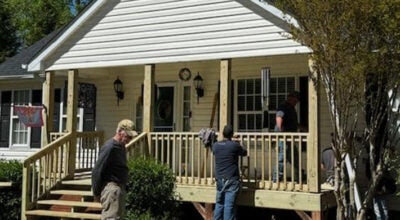The Literary Corner: Renegade Writer’s Guild
Published 8:46 am Thursday, March 31, 2022
|
Getting your Trinity Audio player ready...
|
Clocks Ticking
By Julie Terry Cartner
Lent is a time of reflection, a time when many chose to give up something, but also, maybe, a time to consider what’s important. We should have learned many hard lessons in the past couple of years, and hopefully, we’ve come to value life, love, and good health a bit more. In this Lenten season, I plan to reflect on the simple things that make up the intricacies of life. I challenge you to look around your house and, in your memories, and find objects that give you a memory, things that make you want to sit up and celebrate life, to appreciate what you have, just a little bit more.
One of my favorite plays is Our Town by Thornton Wilder because of the message stated in Act III. Emily, who has died, returns to her home as a twelve-year-old girl. She has the opportunity to re-live one day, but she quickly realizes that it’s just too painful. Speaking to her mother, she says, “… just for a moment now we’re all together. Mama, just for a moment, we’re happy. Let’s really look at one another.” Then as she watches her mother bustling around the kitchen doing her morning chores, she realizes that people are just too busy to take the time to appreciate what they have. In agony, she turns to her guide, the Stage Manager and continues, “I can’t. I can’t go on. It goes so fast. We don’t have time to look at one another. I didn’t realize. So all that was going on, and we never noticed.” Then she asks the Stage Manager to take her back to her grave. Before they leave, she says one more good-bye. “Good-bye world. Good-bye Grover’s Corners…Mama and Papa. Good-bye to clocks ticking…and Mama’s sunflowers. And food and coffee. And new ironed dresses and hot baths…and sleeping and waking up. Oh earth, you are too wonderful for anybody to realize you.”
My goal, over forty days, is to celebrate life, starting with Emily’s list, specifically, clocks ticking. Dad had a Baby Ben alarm clock beside his bed. He didn’t need to use it often, but occasionally, he needed it. The clock was small, just about the size of a fist, but its alarm packed a powerful punch. I loved that little alarm clock with its cheerful tick, tick, tick, and I loved the sound and feel of the clock when you wound it. If you didn’t wind it, the clock stopped, so it was a daily ritual to wind the clock and set the alarm every night. Those were sounds of my childhood.
When I was a teenager, Dad gave me my own Baby Ben. Newer and shinier, perhaps, but not as special as Dad’s. However, that alarm clock symbolized a change in my life. No longer was I to rely on Dad to get me up in the morning; it was now my responsibility. It was up to me to wind my clock, set the alarm, and get up when it went off. Dad was often long gone to work before I had to get up, and though I appreciated the step towards maturity and self-reliance, I also was aware enough to realize my life was changing. I think even then I realized that relying on myself meant Dad’s role in my life was shrinking; he was pulling away, and I was growing up.
That Baby Ben went with me to college and continued with me when I started my first teaching job. Somewhere along the line, the Baby Ben was replaced by a clock radio, and much later, a cell phone. Sometimes I needed more than one morning reminder. Unlike my dad, I have never been a morning person.
Dad’s Baby Ben resides in my nightstand. It no longer runs, but the message lives on. That Baby Ben belongs to a simpler time, a simpler life, a life I can reflect on and cherish, yet understand it can’t be today’s life. Time marches on and little girls grow up, but, like the clock that needed winding, we need to give ourselves permission to re-charge and reflect, to keep moving forward, yet take time to treasure each moment of life.
Davie Doctors
By Marie Craig
I have completed my tenth history book about Davie County, and it is for sale at the library. The research was interesting in locating and compiling biographies about doctors in Davie County who were born before 1900. The final count was 79 physicians. Sources were U.S. Census, other history books, Internet family trees, and files in the history room of our public library. The book includes 34 photographs.
A few physicians had data that remained hidden because of the length of time that had passed. Seventeen of them served as doctors in the Civil War, and four doctored in World War One, with one dying at Camp Jackson in Columbia, S.C. Dr. Lester Martin saw military duty in World War One and Two.
Several families had multiple doctors. I read that the Andersons had 11 doctors and two dentists. There were several fathers whose sons also became doctors. In the mid-1960s, there were 19 feature articles in our local newspaper with medical biographies. Gordon Tomlinson, editor of the paper, wrote 15 of these. One of the articles had this interesting paragraph: “These doctors carried locked in secrecy family skeletons of unhappy family relations often underlying contributions of illness. hey treated souls as well as bodies. And what did they receive in compensation? Five dollars for the delivery of a baby. Often their pay was in produce, gunny sacks of sweet potatoes, peanuts, popcorn, dried fruits. Sometimes a woman patient would pay her bill with a quilt she had put together or she would knit stockings for her doctor’s children.”
The life of a doctor is always difficult, but especially so in those distant times. One doctor kept a horse on both sides of Hunting Creek in case of flooding. Another family had an extra room that they kept ready in case the doctor needed to spend the night because it was too far to ride home in the dark. The 1860 Census listed the profession of one physician as “steam doctor.” Internet research yielded this about a similar doctor: “He [John Stith Pemberton] was trained as a so-called steam doctor in a system devised by the Massachusetts doctor and herbalist Samuel Thomson—a system that relied on herbal treatments and steam baths that, it was believed, would help patients rid themselves of disease by sweating heavily.”
Almost all the doctors had large families and maintained farms for the family. Several were chairmen of political parties and county superintendents of health. The neighborhood columns of our local papers gave insight to their lifestyle like this one in 1911. “Dr. R.M. Griffin, of Farmington, was in town Wednesday in his Brush automobile. The doctor said he made the trip in less than one hour despite the bad roads.”
Dr. John Manley Cain and Dr. Samuel Winfield Little were first cousins who served the northwest part of Davie. Their grandparents are also my fourth great grandparents.
Dr. Johnson, Farmington, was described thus: “He had the confidence of the village and entire surrounding territory. One supporter was heard to say that a bottle of clear water, well shaken by Dr. Johnson, would in the case of pain insure instant relief. In his rounds about the country, riding in his one-horse buggy drawn by faithful “Jay Bird,” he was apt to stop with a neighbor, inquire about crops and the general run of things, and the health of the family. Maybe a few pills from his worn saddle bags would be handed out, just in case.
This was a unique chance to learn more about Davie County long ago.
Oriental
By Gaye Hoots
Oriental is the name of the small coastal town where I now live. It is 20 miles east of New Bern and is known as the sailboat capital of North Carolina. There are roughly 900 residents and 3,000 boats. The area was occupied by native Americans until the 1700s, and thereafter settled by a family named Midyette. One of the town’s streets is named Midyette. Originally the town was called Smith’s Creek, and my home is situated where Smith’s Creek empties into the Neuse River and on into the ocean.
A member of the Midyette family was instrumental in changing the name to Oriental after the wreck of a ship by that name near here. The town is small, and the downtown is a mix of old, old being restored, and a few new homes, but most of the newer homes are in developments around a water view and off the main roads. There is much less traffic than in Advance and the road to New Bern is dotted with small towns that you would miss if you blinked. The road I live on is Treasure Dr. off Teaches Cove, which is named for Edward Teach, the famous pirate known as Blackbeard who lived in Bath and operated in this area.
The county seat is small. Last week I needed some forms from there and when I asked for them, I was the only person in that department. The clerk offered to fill them out for me, had me read and sign them and I was done. Today I went to the local hardware store, which has been here for 40 plus years I am told. I asked if they could recommend someone to remodel my bathroom. They took the time to look up numbers, check with other employees for references, and assured me the person was trustworthy and safe for me to be around.
When I go to Morehead, I take the Minnesott ferry to the Cherry Branch ferry, which is free and is a 3-mile ride. There are more shops, restaurants, and activities in Morehead, but I prefer the smaller town here. The local grocery store is the Piggly Wiggly where I shop. The last time I was there I dropped a bottled drink and the older, and much less mobile, gentleman in front of me insisted on picking it up. I know few people here but get the same down-home treatment I do in Lower Advance.
Most of the activity in the community revolves around the water, sailing, fishing, seafood meals, and waterfront events. The fireworks and boat parades I can view from my yard. I make a trip back to Advance once a month and am looking forward to our class reunion in April.
Hope to see you then.





